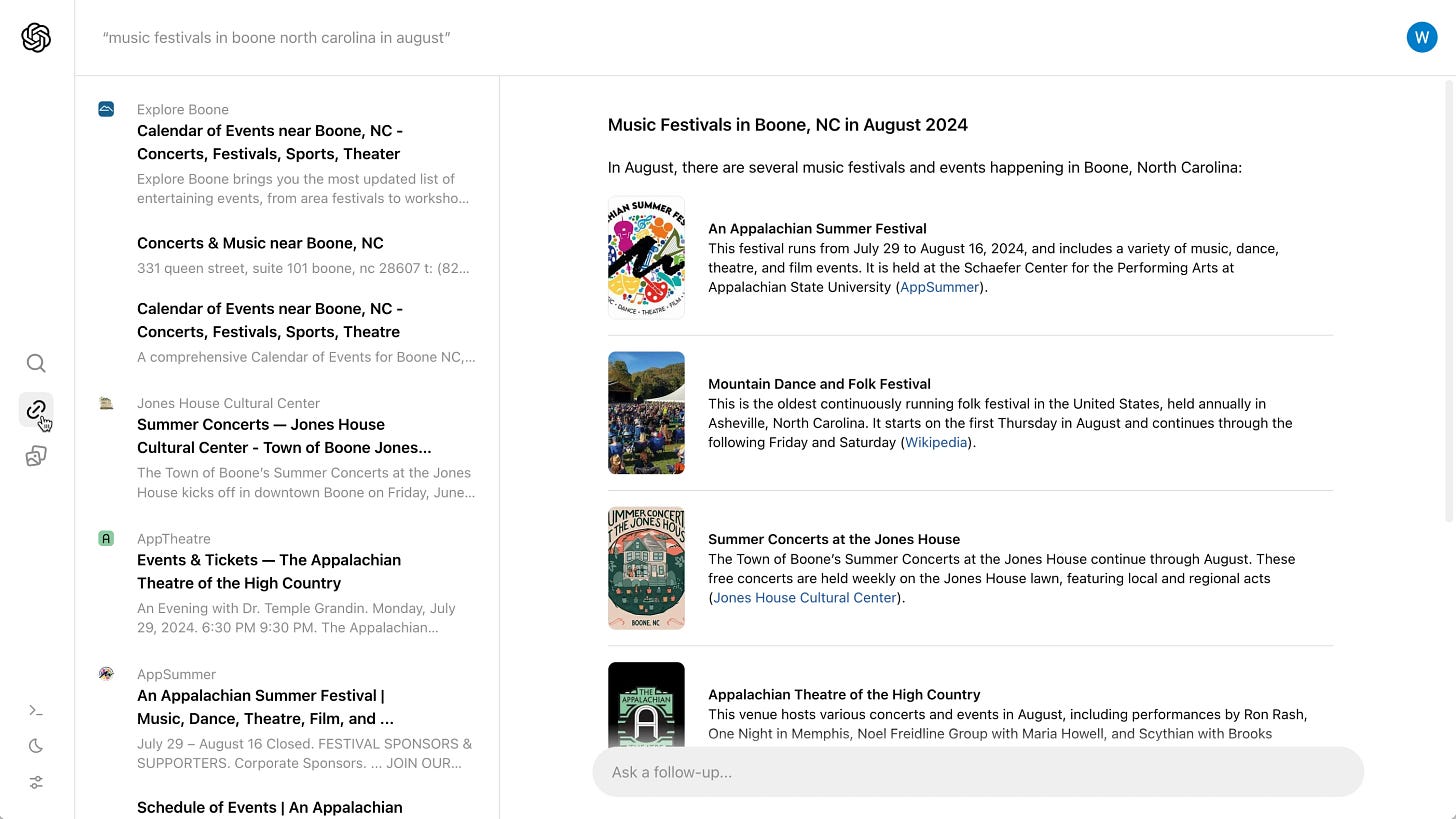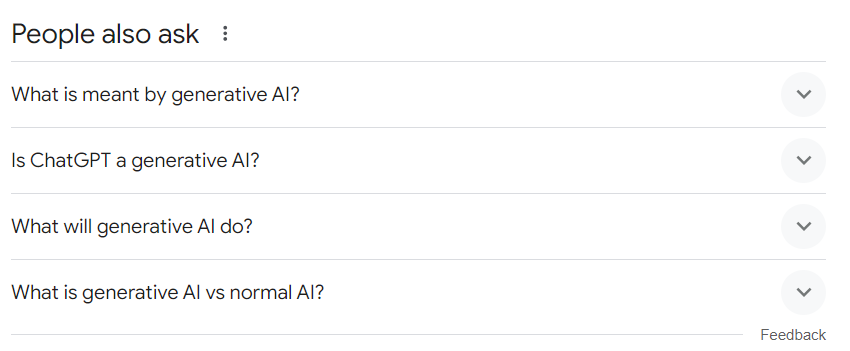The Future of Search: Content is still King
Google, SearchGPT, Perplexity - who will win the battle for search?
For years, Google has dominated the internet search landscape, commanding over 90% of the market share. This dominance has largely been driven by Google's ability to deliver relevant search results through its PageRank algorithm, making it the go-to search engine for most users. Consequently, an entire industry of search engine optimization (SEO) has developed to help businesses optimize their web presence according to Google's algorithm.
However, the rise of generative AI is challenging Google's supremacy. Users prefer concise, summarized answers to their queries rather than a list of URLs. This shift creates an opportunity for new players to provide synthesized information from multiple sources, offering a more holistic and user-friendly experience.
Innovations from companies like Perplexity and the recent introduction of SearchGPT, alongside advancements from big tech firms, signal a potential shift in the search engine landscape. Yet the battle for the future of web search will likely be decided by the access to content, rather than the tech itself.
The Evolution of AI in Internet Search
To understand the impact of AI on search engines, it's essential to revisit how search engines work. The process can be divided into three stages according to Google:
Crawling: The search engine discovers and catalogs all available web pages.
Indexing: It processes and organizes the information on these pages.
Serving Search Results: It provides relevant results to users based on their queries.
In this analogy, the search engine acts as a librarian, gathering, organizing, and recommending books. AI has already been integral in enhancing these processes, from understanding user intent (through algorithms like RankBrain) to delivering personalized results based on user behaviour (e.g. previous searches, time spent per webpage).
However, traditional search was still focused on retrieving the most relevant URLs / excerpts rather than generating comprehensive answers. With generative AI, this is changing. Imagine someone searching for "how to make the perfect carbonara." Instead of listing ten relevant links, users might prefer a concise summary of the best recipes from these websites, including references for further reading. This approach, taken by new players like Perplexity and SearchGPT, offers a more conversational and user-friendly search experience.

Search relevance and accuracy will be an ongoing experiment but not a key differentiator
Integrating generative AI into search engines is not without challenges. While companies like Google and Microsoft Bing are incorporating these technologies, they face hurdles, including the potential for generating inaccurate or misleading information. For instance, Google's AI-generated content has made questionable recommendations, such as advising people to eat rocks and use non-toxic glue on pizza, highlighting the risks of generative AI.
These issues are not examples of AI hallucination, rather they stem from gaps in high-quality content or the inability to differentiate between credible and satirical sources. Although Google quickly rectified these results, the incident underscores the ongoing challenges of ensuring the credibility and accuracy of AI-generated content.
Both Perplexity and SearchGPT (currently in its closed testing phase) have showcased potential models for AI-enabled search. These platforms share similar features, such as providing direct answers with clear source citations and enabling users to engage in follow-up questions. Given the nascent stage of this industry, we anticipate that different players will make advancements in several key areas:
Relevance and Accuracy: The effectiveness of summarizing and understanding content will depend on the sophistication of the underlying AI models, the use of retrieval-augmented generation (RAG) techniques, and ranking algorithms. Equally important will be the quality of content and the implementation of robust guardrails to ensure reliable information.
User Experience: The importance of personalization and multi-modal search capabilities, which allow users to search via text, images, voices, and videos, will continue to grow. Additionally, the approach to advertisements will significantly influence user preferences. For instance, Perplexity has championed an ad-free search experience, potentially considering ads only in follow-up questions, which could appeal to users seeking a cleaner interface.
Action Integration: The ability to directly interact with websites and platforms, akin to the role of AI agents, could become a differentiating factor. This feature would be especially valuable for companies like Microsoft or Google, which can integrate such capabilities across their broader product ecosystems.
Despite these promising avenues for differentiation, the technological and product features discussed above are likely to become commoditized as AI capabilities continue to advance. Therefore, the true differentiation may lie in leveraging existing user bases and ecosystems. For example, SearchGPT could benefit from its integration into the broader OpenAI product suite, while Perplexity might focus on carving out a niche within academic and tech communities or developing enterprise-specific solutions. Meanwhile, Google will continue refining its AI offerings, using its extensive resources and market presence to maintain a competitive edge.
Media content is the new battleground for search engines
The phrase "Content is King," popularised by Bill Gates, remains highly relevant, especially in the era of AI and machine learning. Content serves as the essential data for search engines, with the relevance and freshness of search results heavily relying on material from news outlets and other platforms like Reddit.
Traditionally, search engines indexed and aggregated content, driving traffic back to the original sources. However, the advent of generative AI has changed this dynamic, as users may no longer need to visit these sites directly, potentially altering the relationship between search engines and content publishers. This shift has led to legal challenges, such as lawsuits against Perplexity for allegedly plagiarizing paywalled content and against OpenAI for using copyrighted material to train ChatGPT.
As these legal issues highlight, content publishers are increasingly crucial to the success of AI-driven search engines. In response, tech companies have started forming partnerships with major publications to address content use concerns. For example, SearchGPT has signed licensing deals with news organizations like The Atlantic and Vox Media. Similarly, Perplexity has introduced a revenue-sharing program, granting publishers access to its APIs and compensating them for content used in AI-generated summaries.
Brands can pay to ask specific related follow-up questions in our answer engine interface and on Pages. When Perplexity earns revenue from an interaction where a publisher’s content is referenced, that publisher will also earn a share. (Source)
While these initiatives represent a positive step towards fair compensation, the future dynamics between tech companies and content publishers remain uncertain. As the industry evolves, critical questions about AI bias and the dominance of results by a limited number of organizations will arise. The challenge will be to maintain a balance between diverse perspectives and the integrity of the information provided.
The Uncertainties for Google and Digital Marketing
Will Google maintain its dominance in search? The answer is likely yes, for two main reasons:
Nature of Search: While generative AI provides direct, conversational answers that enhance the search experience, a significant portion of search queries are not looking for answers but rather quick access to specific websites or products. For these queries, many users still prefer Google due to its ease of use and familiarity. Generative AI tools like Perplexity or SearchGPT might be more suitable for specific research purposes rather than general navigation.
User Stickiness: The inertia of switching search engines is a critical factor. For example, Neeva offered an ad-free experience and robust search capabilities but struggled to gain significant market share. Google's position as the default search engine, despite its imperfections, remains "good enough" for most users, making it difficult for competitors to break through.
However, Google must continue advancing its AI capabilities, even if these efforts, like the AI overview feature, are not fully mature and occasionally receive backlash. The inherent fallibility of generative AI provides tech giants with an opportunity to keep experimenting and refining their products without facing severe consequences.
A more significant concern for Google may lie not in search itself but in how generative AI will impact the digital advertising industry. Currently, Google does not offer direct monetary payouts to publishers, instead directing clicks to their sites. With the rise of AI-generated overviews and summaries, traditional SEO and pay-per-click banners may lose some of their effectiveness in driving traffic, prompting Google to reconsider its ad business model.
Meanwhile, the digital marketing industry will need to adapt to AI-influenced SEO strategies that enhance the chances of being featured in citations or sponsored ads within AI-generated content. This adaptation could involve exploring advertising opportunities on other search engines (if Perplexity gains market share) or aligning content with formats that perform well in AI-driven searches, such as content from Reddit, which frequently appears in AI-generated responses.
Conclusion
The increasing competition within the AI search space comes at a time when tech giants are reporting surging capital expenditures on AI and potentially large losses, as high-profile AI startups are absorbed into larger tech companies. The battle for dominance in AI search will continue to be an expensive endeavor, but it won't be dictated solely by the technology players. Instead, it will involve a new set of competitive dynamics across search engines, content publishers, and users that will shape the future of search and digital marketing.





